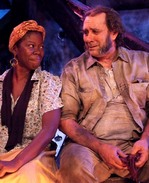SITE GUIDE
SEARCH
REVIEWS
REVIEW ARCHIVES
ADVERTISING AT CURTAINUP
FEATURES
NEWS
Etcetera and
Short Term Listings
LISTINGS
Broadway
Off-Broadway
NYC Restaurants
BOOKS and CDs
OTHER PLACES
Berkshires
London
California
New Jersey
Philadelphia
Elsewhere
QUOTES
TKTS
PLAYWRIGHTS' ALBUMS
LETTERS TO EDITOR
FILM
LINKS
MISCELLANEOUS
Free Updates
Masthead
A CurtainUp Los Angeles Review
The Blue Iris
By Jon Magaril
|
"Without its poison, it's just a pretty little flower. It's useless."<— Sally
|

Julanne Chidi Hill, Morlan Higgins
Photo by Ed Krieger |
Fugard doesn't gild the lily here. His My Children! My Africa! and The Road to Mecca, both revived last year in New York, lasted more than two-and-a-half hours a piece. This new one-act clocks in at a lean, mean seventy-five minutes. That's enough for the master playwright to release his characters from the burdens of the past and, in the process, stir our souls.
A black housekeeper Rieta (Julanne Chidi Hill) and white landowner Robert Hannay (Morlan Higgins) pore through the charred ruins of his farmhouse. It burned to the ground during a lightning storm, which caused the heart attack and death of his wife Sally (Jacqueline Schultz).
The pragmatic Rieta wants to leave with Robert, who's wracked with guilt. He'd lured Sally from the lush greenery of Cape Town here, to the arid plains of the Karoo. As the storm approached, she'd pleaded with him to stay. But he'd abandoned her for a business transaction.
Director Stephen Sachs roots the backstory-laden dialogue in compelling stage action. There's little momentum though. Even this is meaningful. Since the end of apartheid, Fugard's work has focused on the question on the difficulty of moving forward after trauma. The issue is essential but, as the opening of The Blue Irisproves, not inherently dramatic.
Sachs could help things along by prodding the formidable Higgins and Hill to tease out greater depth in their relationship. There's too little groundwork established for Rieta's climactic revelation.
Rieta and Robert find little of worth to carry with them until he unearths a miraculously intact painting of a blue iris. Sally, with little else to do on the farm, had dedicated herself to painting every variety of flower on the drought-ridden property. The discovery lifts Robert's spirits and raises Sally's ghost.
Up to this point the production has stoked our admiration through Fugard's pungent poetry and solid performances. Sally's arrival adds conflict, joy, and terror to the mix. It's a canny construction. First, she appears as part of Robert's flashback to the night he abandoned her to the storm and her death. Then, rather seamlessly, she remains.
We welcome her like water to a parched land. The character is a minefield of traps - the desperately sensitive artist/ spirit - that could push an actor and play over the edge into camp. But Fugard and Schultz avoid them all by staying emotionally true. Peter Baynes' deeply layered, immersive sound design helps make the section especially haunting.
Like many of the eighty-year-old's most recent plays, the Fountain Theatre's production is The Blue Iris' American premiere. Director Stephen Sachs proves deserving of Fugard's trust. Jeffrey McLaughlin's set and lighting design, JB Blanc's dialect coaching, Misty Carlisle's props, Naila Aladdin Sanders's costumes, and the pervasive layer of ash overseen by Production Stage Manager Terri Roberts together weave a transfixing spell.
Sally explains that the blue iris withstands dire conditions through a poison it hides inside it. Similarly, the emotional explosions that rock Fugard's beautiful play are its best chance at surviving the test of time.
|
The Blue Iris by Athol Fugard Directed by Stephen Sachs Cast: Morlan Higgins as Robert Hannay, Julanne Chidi Hill as Rieta Paasman, Jacqueline Schultz as Sally Hannay Set and Lighting Design - Jeffrey McLaughlin Costume Design - Naila Aladdin Sanders Composer/Sound Design - Peter Bayne Prop Design - Misty Carlisle Dialect Coach – JB Blanc Production Stage Manager – Terri Roberts Running Time: Seventy-five minutes without intermission Through September 16, 2012 at the Fountain Theatre, 5060 Fountain Avenue, LA, CA 90029 (323) 663-1525 www.FountainTheatre.com Reviewed by Jon Magaril |
|
REVIEW FEEDBACK Highlight one of the responses below and click "copy" or"CTRL+C"
Paste the highlighted text into the subject line (CTRL+ V): Feel free to add detailed comments in the body of the email. . .also the names and emails of any friends to whom you'd like us to forward a copy of this review. Visit Curtainup's Blog Annex For a feed to reviews and features as they are posted add http://curtainupnewlinks.blogspot.com to your reader Curtainup at Facebook . . . Curtainup at Twitter Subscribe to our FREE email updates: E-mail: esommer@curtainup.comesommer@curtainup.com put SUBSCRIBE CURTAINUP EMAIL UPDATE in the subject line and your full name and email address in the body of the message. If you can spare a minute, tell us how you came to CurtainUp and from what part of the country. |


 Anything Goes Cast Recording
Anything Goes Cast Recording Book of Mormon -CD
Book of Mormon -CD